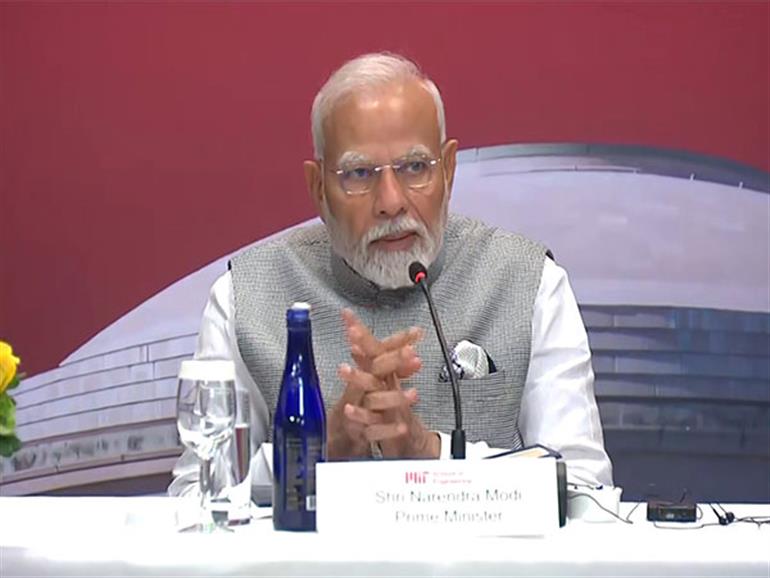
US Tech Giants Are Urged by PM Modi to Invest in India as a Manufacturing Hub
Top US IT CEOs have been urged by Indian Prime Minister Narendra Modi to investigate India as a leading location for semiconductor production, research, and manufacturing.
Leading American tech companies have been urged by Indian Prime Minister Narendra Modi to view India as a top location for innovation and manufacturing.
During a high-profile meeting in New York, Modi made his pitch to 15 notable CEOs of top tech companies, including Sundar Pichai of Google, Shantanu Narayen of Adobe, Arvind Krishna of IBM, and Jensen Huang of NVIDIA.
Following Modi’s attendance at the Quad Summit, which featured discussions on a range of global issues by leaders from the US, Australia, Japan, and India, was this meeting.
Modi emphasized India’s potential at the meeting and urged tech companies to work with the nation.
In India, he claimed, “they can co-develop, co-design, and co-produce for the world.”
The Indian government has been aggressively marketing the nation as a substitute for China for businesses wishing to broaden their supply chains, especially in the semiconductor manufacturing industry.
Even while India has recently concentrated on growing its semiconductor sector, it still lags behind China and Taiwan, two of the world’s largest suppliers. Nonetheless, given the increasing significance of technology in international supply chains, India is optimistic that partnerships with US tech companies will bolster its standing.
The CEOs’ conversations were highlighted by India’s foreign ministry, which stated that the agenda item for the conference was the exploration of technological advances having the potential to “revolutionise the global economy and human development.”
Apart from the gathering with tech executives, Modi spoke to a group of 15,000 Indian Americans in New York, referring to them as India’s “brand ambassadors.” “India is central to global development, global peace, global climate action, global innovations, and global supply chains,” he said, positioning India as a pivotal point in global challenges.
Important agreements, including a historic semiconductor accord, were signed between India and the US during Modi’s visit to the US. The partnership intends to build a semiconductor fabrication facility in India that will provide chips for vital uses like green energy, next-generation telecommunications, and national security.
The Indian facility is anticipated to supply chips to the US and its allies’ militaries, and this agreement is perceived as a component of larger US efforts to lessen dependency on China’s semiconductor industry.
Although the alliance with the US is a big step toward India’s goals in the semiconductor sector, earlier attempts to create a domestic semiconductor industry have run into difficulties. Nonetheless, this agreement supports India’s goals as supply chain diversity is receiving more attention globally.
The Indian Express claims that the semiconductor plant will concentrate on “three essential pillars for modern war fighting: advanced sensing, advanced communications, and high-voltage power electronics.”
Tensions concerning Sikh separatist leaders in the US and Canada have not been eased despite the fruitful talks. The Indian government disputes the accusations made by certain Sikh leaders that they have received threats supported by India. During their conversation, US President Joe Biden and Indian Prime Minister Modi did not touch these tensions.
In addition, Modi’s visit coincided with the approaching US presidential election, as former President Donald Trump recently called Modi “a fantastic man.” But during the trip, there was no interaction between Trump and Modi.
A joint statement by the Quad leaders—Modi included—focused on maritime security in the Indo-Pacific area was also released. The declaration denounced “destabilizing or unilateral actions” in the area without specifically criticizing China. The communique’s harsher wording caught the attention of analysts, who said it was a reflection of growing concerns over Chinese actions in the South China Sea.
“The wording regarding provocations in the South China Sea is more forceful than it has ever been, even though it does not specifically mention China. This is due to the growing apprehension among the four Quad states regarding the intensification of Chinese actions in that region, according to Michael Kugelman, the head of the South Asia Institute at the Wilson Center think tank.
The Quad leaders furthered solidified their shared vision for security and development in the Indo-Pacific region by announcing steps to improve maritime surveillance, establish a network for natural disaster logistics, and combat cervical cancer.
All Categories
Recent Posts
Tags
+13162306000
zoneyetu@yahoo.com



